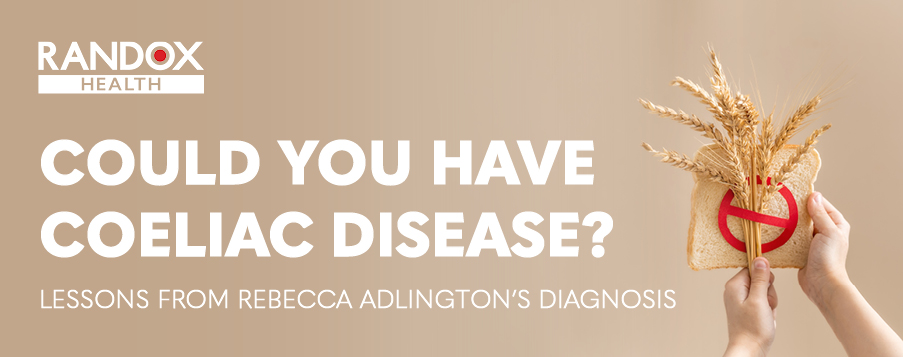09/04/2025
Recently, Olympic swimming champion Rebecca Adlington revealed that she has been diagnosed with Coeliac Disease, a condition affecting a significant portion of the population. As more and more individuals are diagnosed with the autoimmune disorder, it’s important to raise awareness. In this article we answer common questions like what is Coeliac Disease, how does it affect the body, and what steps can you take to ensure a proper diagnosis and management of the condition.
What is Coeliac Disease?
Coeliac Disease is an autoimmune disorder where eating gluten–a protein found in wheat, barley and rye–causes damage to the small intestine. The immune system mistakenly targets and attacks the lining of the small intestine when gluten is consumed, leading to inflammation and damage to the villi, the tiny hair-like structures that help absorb nutrients.
This damage can result in malabsorption of nutrients, causing various symptoms and potentially serious long-term health issues if left untreated.
Key Symptoms of Coeliac Disease
Symptoms can vary widely from person to person and may sometimes be mistaken for other conditions. Common symptoms of Coeliac Disease include:
- Digestive issues: Diarrhoea, constipation, bloating and stomach cramps
- Fatigue: Constant tiredness or fatigue due to nutrient deficiencies
- Unexplained weight loss: Despite eating normally
- Skin rashes: Particularly a blistering rash known as dermatitis herpetiformis
- Joint pain: Stiffness or discomfort in the joints
- Mood disturbances: Anxiety, depression or irritability may also occur
Not everyone with the condition experiences digestive symptoms. Some people may present with more vague or atypical signs such as headaches, infertility issues or even neurological symptoms like tingling in the hands or feet.
Coeliac Disease in the UK: Key Stats
It is thought to affect approximately 1 in 100 people worldwide, but studies suggest that many cases remain undiagnosed. In the UK alone, it’s estimated that around 1 in 100 people are living with the disease, but only 30% of these individuals are diagnosed. This means that a significant number of people may be suffering from the condition unknowingly.
Recent research shows that Coeliac Disease can develop at any age, and it is not just a condition affecting children. It is important for individuals, especially those with a family history of autoimmune diseases, to be aware of the signs and seek testing.
Why is Early Diagnosis Crucial?
Coeliac Disease is a lifelong condition that, if left untreated, can lead to serious complications such as:
- Nutrient deficiencies: Poor absorption of essential nutrients, leading to conditions like anaemia, osteoporosis and delayed growth in children
- Increased risk of other autoimmune diseases: Including type 1 diabetes and autoimmune thyroid disease
- Increased risk of certain cancers: Particularly gastrointestinal cancers, when gluten is not eliminated from the diet
An early diagnosis and adherence to a gluten-free diet is crucial for managing the condition. Following a gluten-free diet allows the small intestine to heal, reducing inflammation and helping to restore nutrient absorption.
At Randox Health, we offer a variety of tests that can help in the diagnosis and monitoring of the disease. Our Digestive-Bowel health test measures Coeliac Disease antibodies that are commonly elevated in individuals with the disease including:
- Anti-tissue transglutaminase antibodies (tTG-IgA): This is the most commonly used test to diagnose Coeliac Disease. High levels of tTG-IgA are often present in individuals with the condition
Test Today
At Randox Health, we offer several comprehensive health packages for the condition:
- Genetic Coeliac Disease Test: A genetic test to identify the HLA-DQ risk variant, helping determine if you are genetically predisposed to Coeliac Disease.
- Digestive-Bowel Health Test: Our non-invasive digestive health test offers a detailed picture of your gut health, helping you to better understand what’s going on inside.
How can you manage Coeliac Disease?
Once diagnosed, the most effective treatment is the removal of gluten from the diet. This involves avoiding all foods that contain wheat, barley and rye, as well as ensuring that no cross-contamination occurs. Gluten-free alternatives are widely available, and many people find that once they have adapted to a gluten-free diet, their symptoms improve, and they feel much better.
Rebecca Adlington’s Coeliac Disease diagnosis sheds light on an important condition affecting many people in the UK without them even knowing it. With more public figures sharing their stories, we can break the stigma and raise awareness on what is Coeliac Disease, the symptoms and need for early detection.
Stay informed, and if you think you might have Coeliac Disease, don’t wait to get tested. Early intervention can make all the difference.



